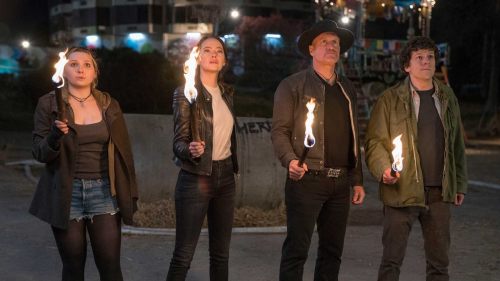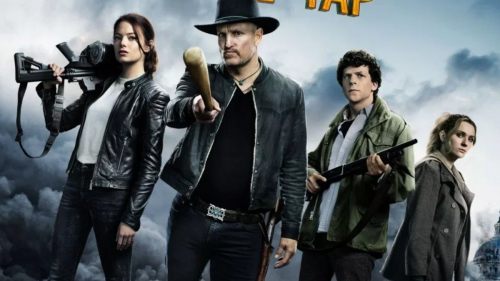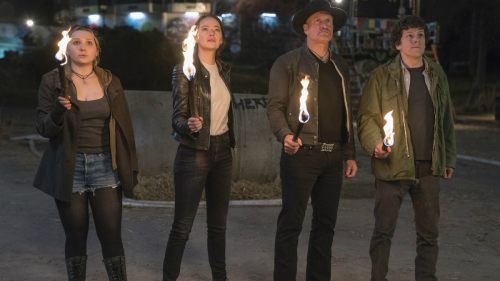LOUDER THAN BOMBS Review: A Quiet Picture Of Detached Compassion
If you’re any good at basic addition, you can solve for the meaning of Louder Than Bombs’ title within its first ten minutes. It helps especially if you have any familiarity with the movie’s source, Joachim Trier, the Norwegian filmmaker who made his hushed entrance into the international cinema scene with 2006’s Reprise and resurfaced in 2011’s Oslo, August 31st. Trier is a man of pronounced quietude, a filmmaker with an astounding gift for amplifying silence to deafening volumes. He is not the type to build toward dramatic crescendos, preferring instead to maintain hushed pitches from the start of his films to their endings. It’s an approach that could be called cold or aloof, but for Trier distance is empathy. He is a relentless witness, but he isn’t heartless.
Louder Than Bombs demonstrates the link between observation and compassion in Trier’s work with astonishing clarity; it’s a movie where silence doesn’t indicate the absence of warmth, but rather the presence of baggage. The film is populated with emotional porters lugging around unexamined feelings: Guilt, grief, loneliness, even anger, and especially uncertainty. It’s a movie where the stakes hinge on closure. Trier writes his plot around the passing of war photographer Isabelle Reed (Isabelle Huppert), who survives a career documenting horrors the world over only to die in a car crash. The accident occurs two years prior to the events of the film. In the present, we become acquainted with her husband, Gene (Gabriel Byrne), and their two sons, eldest Jonah (Jesse Eisenberg) and youngest Conrad (Devin Druid), as they each cope with their loss in their own unique ways.
Jonah, who we see with his wife and newborn son at the start of the picture, is marshaling a family of his own. Gene busies himself tailing Conrad all over town, helplessly watching his son’s anguish from afar. Conrad loses himself in video games, writing stream of consciousness essays, and dancing like Napoleon Dynamite when he thinks nobody’s looking. All three are settled into patterns of bereavement. Then Gene meets with Isabelle’s colleague, Richard (David Strathairn), who is writing a remembrance of Isabelle for The New York Times, in which he means to speak openly about her death. Her accident wasn’t an accident. It was suicide. Gene knows. Jonah knows. Conrad is in the dark; he was too young to hear the truth at the time.
You can see where a less confident director would have revolved Louder Than Bombs around Gene and Jonah wringing their hands at the thought of Conrad getting the inside scoop about his late mother. You can see where that alternate version of the film would drive forward with an overarching goal of arriving at a confrontation between father and sons. But Trier isn’t interested in melodrama. He is interested in his characters, even Isabelle, who we get to know through flashbacks, including several imaginings of her final moments. In his mind, Conrad pictures how Isabelle might have happened into the path of an oncoming truck, piecing together the collision with all of the poetic visual artistry of a very different filmmaker named Trier. It’s beautiful stuff, but it’s all flight of fancy, and we know it.
The gap that separates Conrad from reality is much like the gaps that Trier installs between Conrad and Gene, between Gene and Jonah, between Jonah and Conrad, between Isabelle and the men in her life, and between us and the Reed clan. But for all of their division, these people love one another. They just don’t know how to say it, or they can’t because they’re too stricken by their sorrow. They’re all outsiders amongst themselves, Isabelle especially. In the film’s third act, Richard sits down with Gene and explicates the strain Isabelle endured straddling her life at home and her life behind the lens: “You follow your convictions, your dreams, your passions,” Richard laments, “and then all of a sudden, one day, that’s your life. And you are split. Right down the middle.”
Trier keeps a handle on his sundered characters through crisp visual storytelling. His aesthetic isn’t flashy, but he has a deep, abiding grasp of how his camera forces the Reeds to relate to one another. When we watch Gene follow Conrad around after school, we see a father desperate to have any kind of connection with his child, even one that the child isn’t necessarily aware of. When later we learn that Conrad actually knows that Gene is shadowing him, everything we see from Gene’s perspective flips, and all that we’re left with is a confused kid dealing with unresolved anguish that manifests either as apathy or rage. (When see Jonah with his baby, we can’t help but wonder what kind of father he’ll turn out to be in contrast to Gene.)
In everything, Trier remains a bystander. He doesn’t interfere with the interplay of his excellent cast, from Byrne, who hasn’t had a role this good since 2006’s Jindabyne; to Druid, who conveys layers of sentiment with the barest expressions; to Eisenberg, who reminds us all that he is, in fact, an actor after his baffling turn in Batman v Superman: Dawn of Justice; to Huppert, who stays enigmatic even as she forces us to consider Trier’s artistic intentions. In a montage of wartime imagery, she muses in voiceover about the relationship she has with her subjects. She wonders whether she should tell their story their way, or exploit their victimhood to tell a story that’s bigger, or more important. We wonder whether or not Trier wrestles with this same conflict himself. If so, he falls under the former category. As remote and indifferent as his style might be, he is nonetheless one of our most humanist directors.



